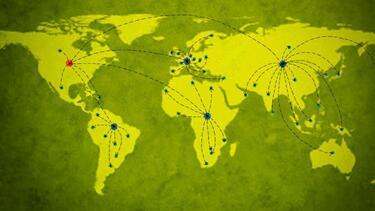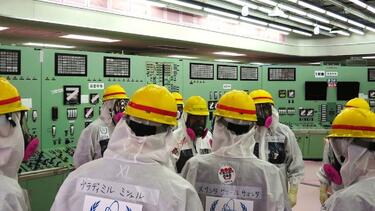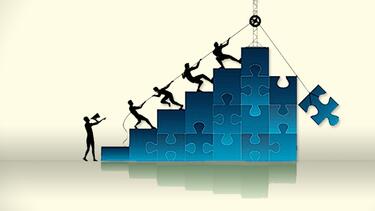Alumni
Closed Borders Choke America’s Innovation Engine
A growing, dynamic economy desperately needs smooth, legal pathways for highly skilled immigrants, says Doug Rand ’10, co-director of the Talent Mobility Fund.

Can impact investing have an impact?
Impact investing, a growing niche in finance, seeks to marry strong financial returns with positive social impacts. That can mean investing in companies whose products improve the environment, or it can mean helping a startup find ways to positively contribute to the neighborhood where it’s based. Nancy Pfund ’82, founder and managing partner of DBL Investors, talks about the growth of the sector.
Can a town reinvent itself before its economic engine disappears?
Tabubil is a town of about 30,000 people, deep in the mountains of Papua New Guinea. It was built by the operators of the Ok Tedi mine, an open-pit gold and copper mine. But now, with the end of the mine’s life in sight, the town faces a stark challenge: completely remake itself or disappear. John Wylie, former head of the Tabubil Futures Initiative, talks about what it takes to imagine a new economy and a new way of life for the isolated community.

How much has investment banking really changed?
The investment banking industry has been subject to new scrutiny, increased regulation, and changing capital requirements since the financial crisis of 2008. How much has this changed what bankers do? Yale Insights spoke with industry veteran Fred Terrell '82.
How does China drive the mining and metals business?
The $1.5 trillion mining and metals sector supplies the feedstock for a large part of everyday life—from coal for power, to iron ore for steel girders, to the minerals and metals that are processed into the components of your iPhone. John Lichtenstein '83, a consultant and 30-year veteran of the sector, describes the state of this global industry and how one country—China—has an outsize influence on commodity prices everywhere.

Can local empowerment create lasting change?
Over the last 50 years, Western aid to the poorest countries has often failed to make tangible improvements in the lives of their citizens. Nadim Matta '89, president of the Rapid Results Institute, talks about the organization's approach to achieving incremental change by empowering frontline stakeholders.

What are your options in the health insurance exchanges?
The insurance exchanges at the center of healthcare reform will open for business later this year. Alongside existing for-profit insurers, the exchanges will include new nonprofit insurers called Consumer Oriented and Operated Plans (CO-OPs). Allison Silvers '90, chief operating officer of a CO-OP sponsored by the Freelancers Union in New York, discusses the health insurance exchanges and what it takes to create a new kind of insurer.
How do you set strategy for a global enterprise?
Long-term thinking often gets lost in solving short-term problems, but the most successful companies make corporate strategy a top priority.

How do you lead a company through a nuclear accident?
The 2011 tsunami and the meltdown of the Fukushima Daiichi nuclear power plant in Japan shattered the nuclear industry’s "safety myth" and prompted the shutdown of all nuclear power plants in the country. Naomi Hirose '83 talks about leading the plant’s operating company through an unprecedented cleanup and rebuilding effort.

What are the forces changing the banking industry?
John Shrewsberry, the president of Wells Fargo Securities, outlines how government regulation and the ongoing tight credit environment are affecting the banking industry—and how big banks can keep up with the rapid pace of change today.
What makes an organization change?
With the financial sector attempting to adapt to regulatory and economic uncertainty, firms are forced to prioritize and change. Phil Davis '85, an experienced management consultant, discusses the factors that can make organizational change succeed or fail, whether in the financial industry or another sector.
